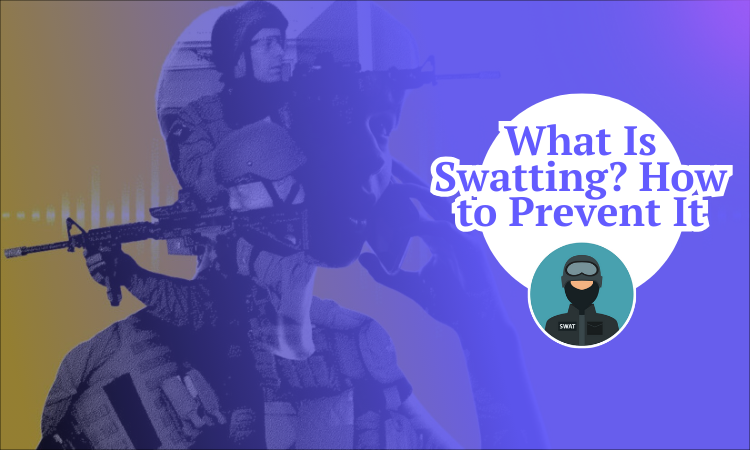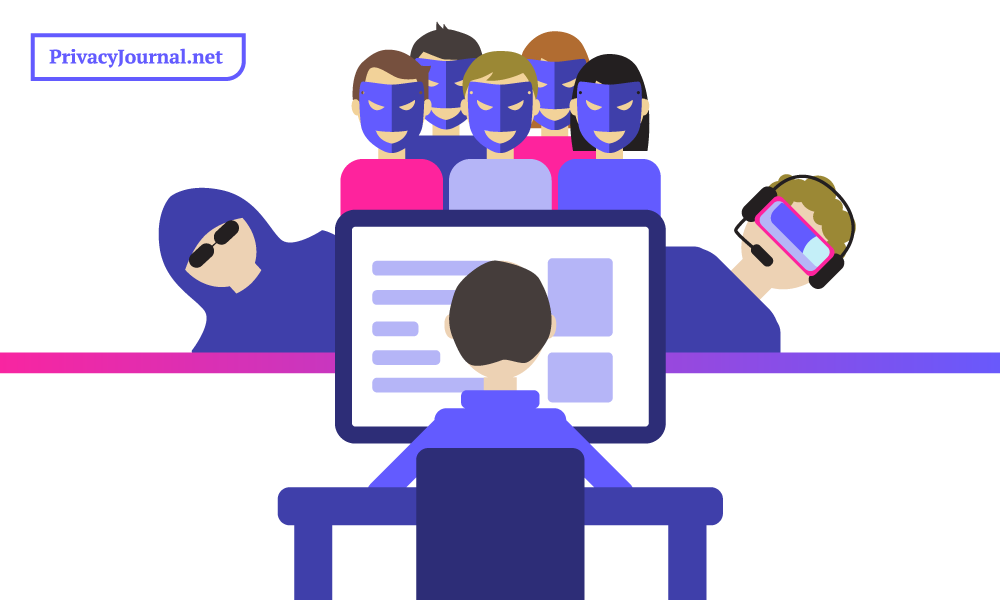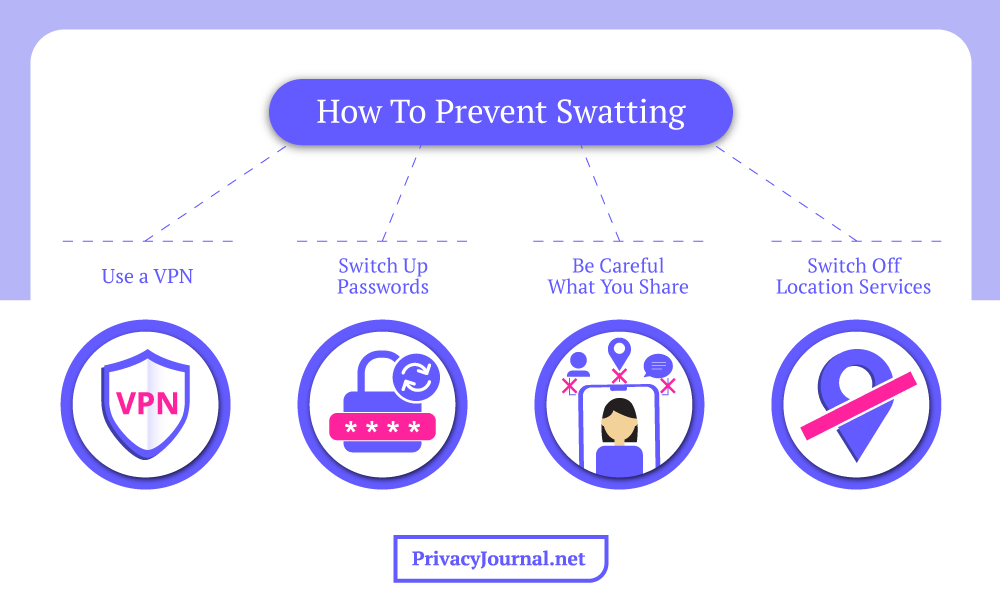
What Is Swatting, How to Avoid It in 2025 & What to Do if You’re Swatted
Quick Answer: What Is Swatting?
Swatting is a form of cyber harassment. Your location details are forwarded to emergency response teams (mostly SWAT) with a false report of illegal activity. It usually leads to your house being raided.
You’re not alone if you’ve heard about the increase in recent swatting calls and wondered, “what is swatting?” In short, swatting is a dangerous cyber hoax when someone places a fake call to law enforcement officers, resulting in a SWAT team arriving at the victim’s address for a false emergency.
Although the phenomenon of swatting has existed for a couple decades, recent years have seen a spike in these sometimes deadly crimes. The cyber hoax of placing fake calls to emergency services has spread past the gaming community and into political figures, schools and places of worship by people who have personal or societal grievances.
Swatting is a criminal offense that gets even the Federal Bureau of Investigation (FBI) involved, so it’s not something you want to be caught doing. In this article, I’ll explain what swatting is, how it works, its legal implications, how to prevent it with the help of the best VPNs, and what you can do if you fall victim to it.
What Is Swatting?
Swatting is when someone online makes a false report to the police or emergency services with your home address, leading to a SWAT team or other armed response unit raiding your home. Though most people do it as a prank, swatting has resulted in tragedy more than once — not unlike cyberbullying, as you can read about in our cyberbullying statistics roundup.

For example, Andrew Thomas Finch, a resident of Wichita, Kan., was shot and killed by a SWAT team after an individual named Tyler Barriss swatted him in a dispute over a game of “Call of Duty.” Because of the potential for deadly consequences, swatting is illegal in the United States and carries the heavy punishment of a federal prison sentence.
How Does Swatting Work?

Swatting is mostly conducted through anonymous calls and messages. The perpetrators usually mask their locations and identities to avoid easy detection, since what they’re doing it’s illegal. Some of the ways a swatting culprit might carry out an attack are as follows:
- Hacking: Some of the most notorious swatters are hackers who gain access to sensitive information about their intended victims. They can find phone numbers, email addresses and all the necessary details to make the swatting call look more legitimate to law enforcement officers.
- Social engineering: This involves swatters gaining your trust by posing as individuals from your employer, bank, school or other institution. They send you emails with sections that urgently demand your personal data. Complying can lead to more than just swatting — it also commonly leads to hacks, as our ransomware statistics show.
- Spoofing: A swatter can also disguise the communication medium they use to swat you and make it seem like it’s coming from a different location. VoIP services are their favorite tools, as they’re never linked to any specific location. This is how they can call police departments in cities they don’t live in.
- Collaboration: Some swatters combine their efforts by sharing a target’s information among themselves and then timing their reports to make them sound more believable. If SWAT teams receive multiple reports of ongoing illegal activity in your residence, they are more likely to be taken seriously.
- IP address tracking: If you frequently use unsecured networks, there’s a high chance a determined hacker can learn your IP address. Knowing someone’s IP address means understanding the geographic location. If this is paired with other known details, these bad actors can potentially pinpoint your home address.
Is Swatting Illegal?
Yes, swatting is illegal, and a perpetrator can be charged with any of the following offenses:
- Providing false information that disrupts lives. This includes fake bomb threats, threats of arson or any large-scale threat that forces a response from law enforcement agencies. These types of swatting carry the longest jail sentences.
- The law also views swatting as a form of stalking. Making concerted efforts to find someone’s address and filing a false report puts the victim under emotional distress and constant fear of harm.
- A swatter can also be charged with wire fraud for relaying inaccurate information that leads law enforcement bodies to waste resources that would otherwise have helped people in actual danger.
Why Are Swatting Incidents Dangerous?
Swatting incidents are dangerous for the victim and can even lead to death in some instances.
The swatters themselves also face the following possible outcomes:
- Criminal charges: Swatting is a criminal offense with a life sentence if it leads to death and a sentence of 5-20 years if it leads to bodily harm. Besides Tyler Barriss, swatters who have faced the full force of the law include Shane Sonderman and Alan Filion, among many others.
- Non-legal consequences: Once word gets out about a swatting incident, the swatter can face consequences outside the legal system. Adults may be fired from their workplaces, while children can face suspension and expulsion.
- Payment compensation: SWAT teams are never known for being friendly or gentle. If the victim is injured or their property is destroyed, the swatter is liable. Guadalupe Santana Martinez was ordered to pay more than $24,000 in damages and was jailed for 30 months for swatting.
Swatting on the Rise: Who Are the Most Common Victims of Swatting?
Swatting isn’t a new phenomenon; it goes as far back as the early 1970s, when false bomb threats were common.
Swatting victims come from all walks of life, but many of them are Twitch streamers, people in gaming circles and other prominent figures. Targets and attackers don’t just live in the top gaming cities; they can be anywhere and go beyond homes, including schools, mosques or churches, or political offices.
Within recent years in the U.S., there have been more cases of swatting hoaxes related to politics and religions, including mosques and Jewish institutions.
Past High-Profile Swatting Targets
There have been major incidents of high-profile individuals being swatted. In 2014, Ashton Kutcher was swatted by a 12-year-old boy who lied about an ongoing hostage situation at Kutcher’s residence. The same boy was involved in another swatting incident against Justin Bieber shortly after and was later arrested.
Another swatter targeted Tom Cruise in 2013, claiming there was an active robbery underway. Many police responded to the report but didn’t find anything matching the swatter’s claims. The person behind the call was never caught.
Swatting isn’t limited to celebrities; American politicians have also fallen victim. The most recent cases include Alabama senator Tommy Tuberville. Responding officers from the Lee County SWAT team visited his family home in 2023 after a false report of an attack.
Another high-profile swatting target was Jack Smith, a special counsel overseeing the prosecution of former President Donald Trump. Smith was swatted after reports of a shooting at his Maryland home on Christmas Day in 2023. The perpetrator wasn’t identified.
How to Prevent Swatting

Swatting can be devastating, but there are ways of protecting yourself from swatting reports by protecting your private details. The following methods have proven successful:
- Use a VPN: A reliable VPN encrypts your internet traffic, hiding your real IP address. However, VPNs only protect you against people who don’t already have your details. A VPN can’t stop a swatter who already has your IP address.
- Switch up passwords: When you use weak and repetitive passwords for all your apps and online accounts, it’s easier for hackers to break through and access your information. I highly recommend never using the same password for all your accounts and changing them periodically. Use a password manager to keep track of all your unique passwords. Our article on password security shares more tips.
- Stop oversharing: I know there is a strong allure to broadcasting every little detail of your life, but it comes at a cost. One reason for the uptick in swatting is the availability of so much personal information on social media. People post their houses, addresses, where they work and more — all easy pickings for swatters and social media scams.
- Switch off location services: Switch off geolocation tracking for unnecessary apps and only activate them when needed. Fortunately, apps can’t access your location without your permission, and you should withhold that permission to limit the chances of a hacker discovering where you are and swatting you.
What to Do if You’re the Victim of a Swatting Attack
Once you determine that you’ve been swatted, immediately follow these steps:
- Stay Calm
You will likely be confronted by the police banging on your door, and the confusion may cause you to do something drastic. You must remain calm throughout the ordeal without making any sudden movements in front of a heavily armed SWAT team. Answer all the questions you’re asked and be as cooperative as possible.
- Notify Your Phone Carrier
The local phone company could help track down the swatter who called the police. Swatting may also be connected to stalking activity. If you’ve received suspicious calls or texts from unknown numbers, keep a log of them, as they may be related to the swatting.
- Report the Matter
Once the police officers have determined it was swatting, don’t let the matter rest. Immediately file a report with the nearest police station so an investigation can commence. Remember, swatting is a criminal offense, and swatters do get caught.
Conclusion
The internet may have made our lives easier and more fun, but it has also created a playground for some of the most malicious users ever to exist. There’s no surefire solution for swatting; the best you can do is minimize the damage by using a VPN and never publicly revealing any information that could be used against you.
If you have ever been a victim of swatting, how did it take place? Have you taken any preventive measures? Let us know in the comments below. We appreciate your continued readership.
FAQ: Swatting
What Are Doxxing and Swatting?
Doxxing is the act of publicly releasing someone’s personal information, like their name and location, without their consent with the goal of intimidating and harassing the intended target. Swatting means making false reports to the police about a person or the location they’re in to trigger a heavily armed response.What Does “SWAT” Mean?
SWAT is an acronym for Special Weapons and Tactics. It’s a military-like unit of well-trained and heavily armed emergency response personnel who handle dangerous situations like shootings, hostage-taking and riots, among others.How Can I Avoid Getting Swatted?
You can avoid being swatted by using a VPN, limiting the amount of personal information you share online, deactivating your location services and regularly changing your passwords to increase your online security and privacy.

Leave a Reply